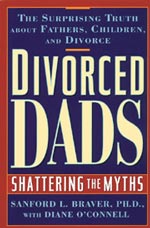![]()
one of Canada's two national newspapers
Ideology trumps equality
National Post, Barbara Kay, Wednesday, June 21, 2006
'For Heaven's sake, a man is cheating on you, you do what every wife in this country does: You take him to the cleaners. Get his house, car, kids -- make him wish he was dead."
Those were the words of a female assistant district attorney explaining to a Texas jury in 2003 that there was no need for defendant Clara Harris to have resorted to murdering her philandering husband (she drove his new Cadillac back and forth over his body before horrified onlookers -- when family law already offered such excellent legal remedies for revenge.
"Make him wish he was dead"? Addressing 12 mainstream men and women it was utterly crucial not to offend, the prosecutor took for granted their complicity in winking at overt anti-male bias in the justice system.
Note also that she ranked "kids" last amongst men's assets, furthering the popular myth that separated fathers disengage easily from their children.
In fact, non-custodial fathers' loss of their children causes them fathomless anguish. Herein lies a paradox: We know that fatherlessness is the single biggest predictor of criminality for boys, and low self-esteem for girls, leading to a variety of social failures. Nevertheless, no significant swell of political will has yet materialized to bring Read More ..lance into post-separation childcare.
Family law in the U.S. and Canada today continues to serve up the "make him wish he was dead" option to women, who win sole custody in 90% of disputed cases. Non-custodial fathers are perceived as money machines with occasional babysitting privileges. Mothers can flout court orders and block access with impunity, but fathers are immediately and disproportionately criminalized by failure to provide often-ruinous "child" support (mothers are not accountable for expenditures). Cocaine dealers -- half of whom, ironically, are fatherless -- serve 20 days out of 30-day jail sentences; a father in support arrears serves the full 30.
Echoing the fate of all political revolutions, reform of the patriarchy began as a campaign for equality -- then the pendulum swung too far, ending in rigid CorrectThink, the suppression of heresies and wholesale blame of the Other (men) for the delayed realization of Utopia.
The family law system is now systemically colonized by radical feminists. Their goal is the complete autonomy of women (except for financial support), via the incremental legal eclipse of men's influence over women's spheres of "identity" interests, which includes children. Thus the custody issue has become a front line in the gender wars.
By no means an exhaustive list, radical feminism is supported by collective rights-dominated law school curricula; feminism-riddled "cultural studies" and the humanities in general; women's studies departments, in reality feminist recruitment and networking centres/ideological boot camps; politically powerful, tax-funded feminist groups who extend strategic mentorship to a wide substratum of women's causes; supine prime ministers and go-with-the-zeitgeist justice ministers; and a critical mass of ideologically aggressive judges, whose juridical archives, bristling with subjective, gender-biased judgments, discredit their vocation and call into question the whole notion of equality under the law.
To illustrate, just a few examples:
- Supreme Court of Canada chief justice Beverley McLachlin: "We have to be pro-active in rearranging the Canadian family"
- Former justice minister Martin Cauchon: "Men have no rights, only responsibilities"
- Feminist psychologist Peter Jaffe, a social-context educator of family court judges: "[J]oint custody is an attempt of males to continue dominance over females"
- National Association of Women and the Law: "Courts may treat parents unequally and deny them basic civil liberties and rights, as long as their motives are good"
Their efforts have not gone unnoticed. "Feminists have entrenched their ideology in the SCC and have put all contrary views beyond the pale," lawyer and civil libertarian Eddie Greenspan has said. Liberal MP Roger Galloway, who chaired the 1998 Report of the Special Joint Committee on Child Custody and Access, has commented that "Justice, if it occurs in a divorce court, is accidental".
It's a trickle-down process. Elites like Status of Women write the script. A social services "gofer" reads it, then asks a child in an assessment interview (the following was read to me from an actual transcript): "What's the best thing and the worst thing about your father no longer living [at home]?" The best thing? Why this leading question?
Fortunately children don't read or care about feminist scripts. As the "worst thing", that particular pre-adolescent girl responded, "I don't have a father." And the "best thing"?
"Nothing."
Next week, I'll continue my series on anti-male bias with a look at solutions: what children, fathers and 90% of Canadians want, but feminists are determined they won't get.
bkay@videotron.ca National Post 2006





